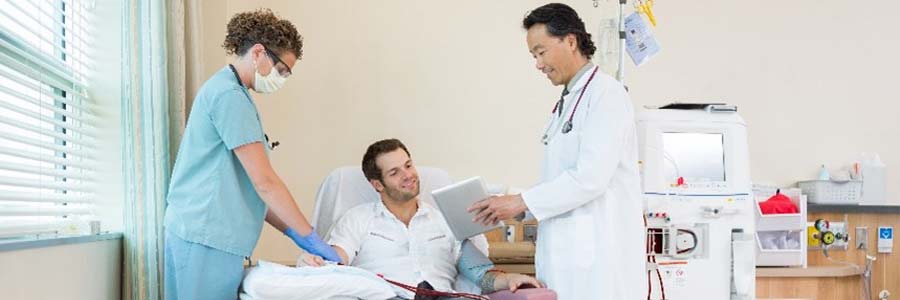As per National Kidney Foundation, 37 million American adults have Chronic Kidney Disease (CKD) and millions of others are at increased risk. Having an understanding of kidney health, timely diagnosis and treatment can prevent kidney disease from getting worse.
People who have increased access to health information are better able to make improvements, and kidney patients can make a better decision for their treatment procedure while conversing with their healthcare provider. It also helps in knowing prognosis, managing mental health, advance care planning costs, and healthy eating habits.
Not only this, learning the basics of kidney functionality, disease symptoms, and complications, can enable an individual to check their kidney health at home, and detect any kind of kidney disease at an early stage, and take appropriate action at right time. Our CKD Patient Education Videos aim to empower you with this necessary information.
Types of kidney disease and stages-
Kidneys are paired organs situated on both sides of the body at the lower back section under the ribs. The main function of the kidneys is to filter the blood and remove impurities, excess salt, and minerals from it. Kidney disease is diagnosed, when your kidney does not perform proper filtration and your body starts showing associated symptoms (discussed in next section).
There are mainly two types: chronic kidney disease (CKD) and Acute Kidney Disease (AKD).
When a kidney suddenly stops working, doctors diagnose it as an Acute Kidney Disease or acute kidney failure. The main cause of AKD is a traumatic injury, autoimmune disease, heart or liver failure, taken drugs or toxins, kidney sepsis, a severe COVID-19 infection, etc.
On the other hand, a Chronic Kidney Disease is diagnosed, when your kidney health is impaired for more than 3 months, and kidney disease progresses slowly. The major cause of CKD is Diabetes and High Blood pressure. CKD has five different stages starting with minor kidney damage at stage 1 to complete kidney failure in stage 5(last stage) also known as end-stage renal failure. Below are the 5 stages of chronic Kidney disease.
Initial symptoms of kidney disease-
At the very early stage of disease, kidneys do not show any significant symptoms usually. As the kidney health deterioration progresses, symptoms from minor to severe start appearing in the patient, depending on the stage of kidney disease. Below are few kidney disease symptoms that a patient may suffer at an early stage:-
- A need to pee (urinate) more often.
- Tiredness, weakness, low energy level.
- Pain in the upper back or torso.
- Metallic taste in the mouth.
- Loss of appetite.
- Lightheadedness.
- Swelling of your hands, feet, and ankles.
- Shortness of breath.
- Blood in your urine, foamy urine.
- Puffy eyes.
- Dry and itchy skin.
- Trouble concentrating.
- Trouble sleeping
- Numbness.
- Nausea or vomiting.
- Muscle cramps.
- High blood pressure.
- Darkening of your skin or bruise.
- Sexual health problem.
- Weight loss
Glomerular Filtration Rate (GFR) and Kidney failure stages-
Glomerular filtration rate (GFR) or Kidney Number, is a primary indicator of your kidney health.
Glomerular Filtration Rate is used to measure how your kidneys are functioning, measure the stage of kidney disease and let your doctor decide the treatment plan. GFR is a blood test known as the Blood creatinine test. As the GFR value decreases it leads to kidney failure. The below picture is showing the GFR value and respective kidney disease stage.
You can use the GFR Calculator here to know your kidney number.

Kidney Treatment Procedure-
Depending on the underlying causes and stages, some kidney diseases can be treated. Often, though, chronic kidney disease has no cure. The kidney treatment procedure ranges from oral medication to complicated surgeries like a kidney transplant. After diagnosis, your doctor plans a treatment procedure to control the cause of the disease, signs, and symptoms, reduce complications and progression of the disease.

Kidney disease complications can be controlled by 3 major treatment categories as classified below: –
- Controlling underlying causes: – High Blood pressure, high cholesterol level, treating anemia, protecting bones, controlling, and lowering protein diet, etc.
- End-Stage kidney disease treatment: –
- Dialysis: – Hemodialysis, Peritoneal dialysis, and Continuous Renal Replacement Therapy (CRRT)
- Kidney Transplant: With Living Donor and Deceased Donor
- Potential Future Treatment: – Boosting natural healing, using healthy cells, tissues, or organs to replace diseased one, delivering healthy cells or tissue to restore the organ function, etc.
As per National Kidney Foundation, there are 3000 new patients adds to the kidney transplant waitlist every month and the median wait time for an individual’s first kidney transplant is 3.6 years, which may vary depending on health, compatibility, and availability of the organ.
Our CKD Patient Education Videos aim to empower you with all the necessary information regarding chronic kidney disease. Visit the website for more information – www.KidneyHealth101.com